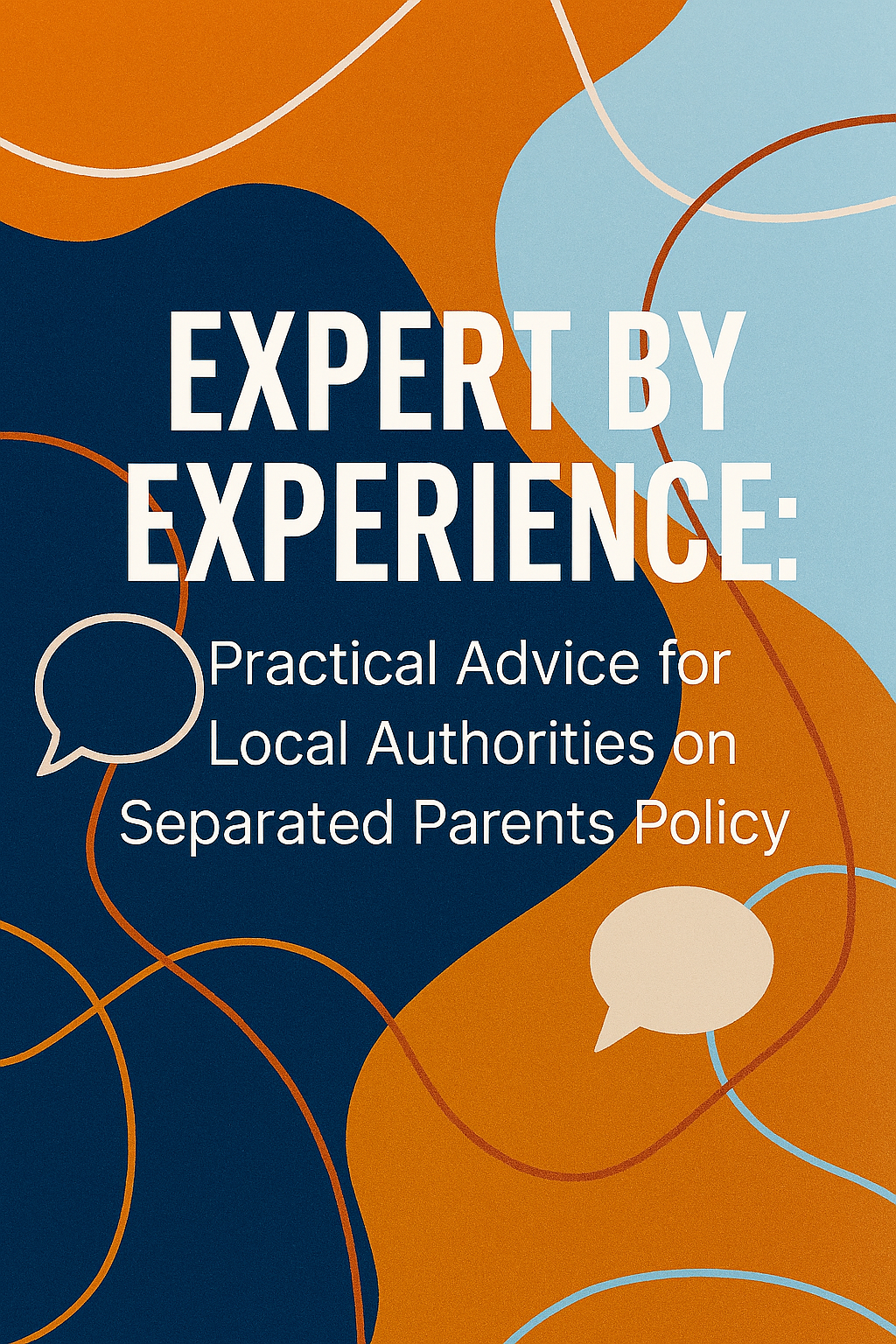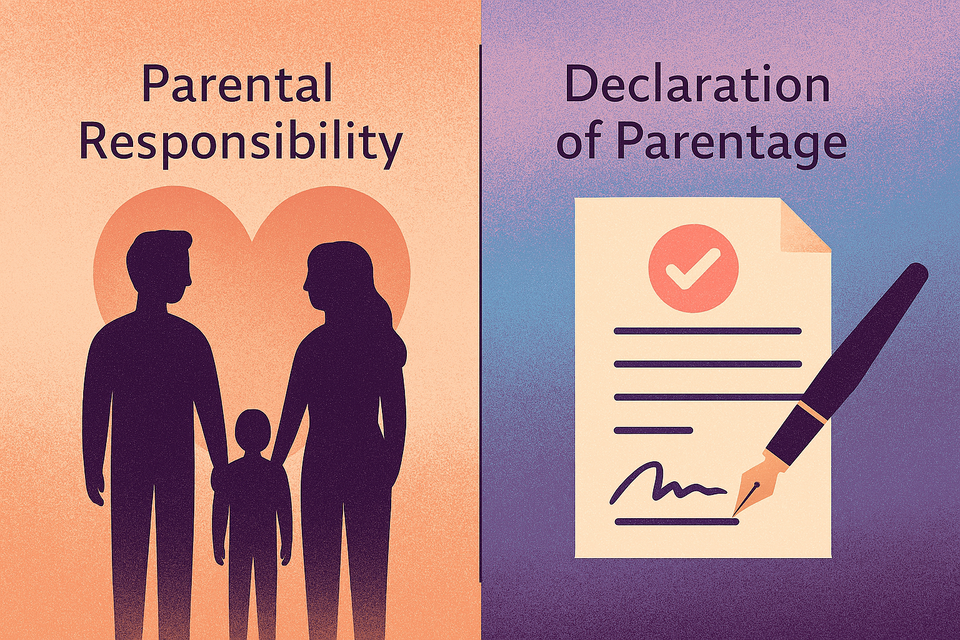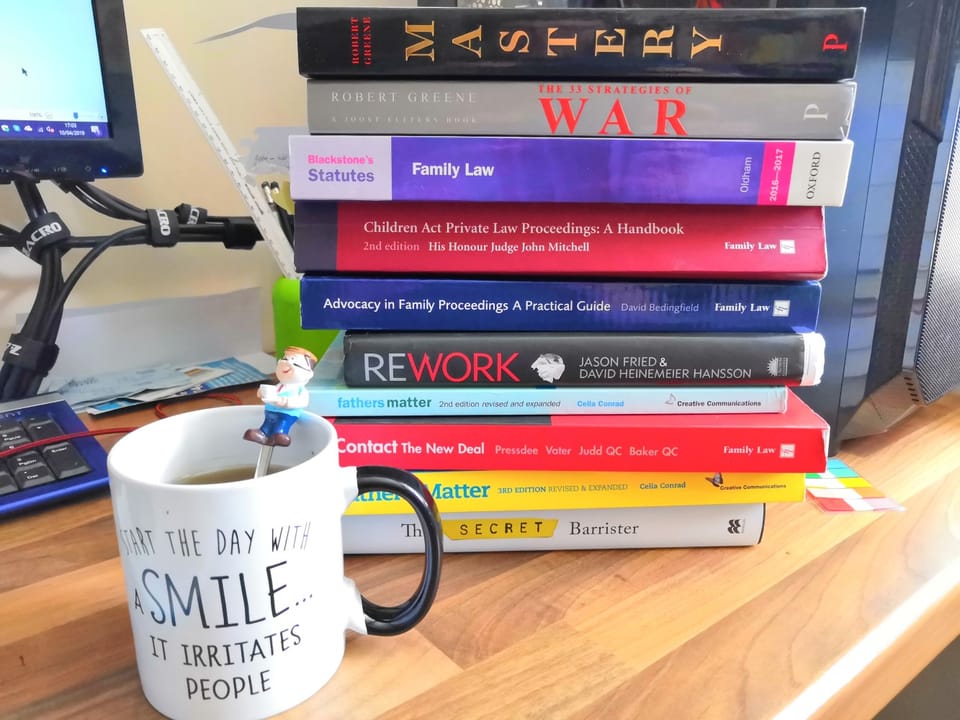Expert By Experience: Advice for Local Authorities on Separated Parents Policy

On being asked for my advice as an Expert By Experience to help create a local authority policy aimed at supporting schools to communicate better with separated parents, I thought it would be worth translating my advice to a blog post which can be passed to other local authorities, schools or shared with other experts because my experience will definitely not be unique and quite unfortunately, there is a lot of work to do around the country at other local authorities with the suggestions that I would make.
It's worth mentioning that this particular local authority is looking at policy where parents are in conflict and whilst many of the recommendations I will make translate to situations where parents are in conflict, they will also work where parents are not in conflict for reasons that will become apparent.
What is Parental Conflict?
Before I make any recommendations, I think it's important that we define "parental conflict" and very helpfully, I have a definition to hand. In my Stronger Relationships post I talk about the workshop by Caroline Porter. To quote part of that post -
The second workshop was with Caroline Porter who fielded some questions from the DA Officers about the definition of Parental Conflict. Their concern was that it might lead to confusion and cases being written off as "just parental conflict". That was a fair point which I thought was well put across with valid examples, but Caroline had some helpful graphics on her power point showing where the definition changes from Parental Conflict to Domestic Abuse. There is a grey area in the middle but it's possible to distinguish based on the relationship dynamics and power imbalances. She said it basically boils down to if the couple are "equal" in the relationship - if they are, it's conflict. If not, it's abuse.
I have emboldened the important section. From that quote, we can deduce that when we talk about parental conflict, we are talking about conflict between parents where the dynamics and power are equal. We are not talking about abuse.
That being said, I believe authorities still struggle to separate the two especially where parents might be expressing themselves in a manner that the authority deems to be hostile or "uncooperative". Local authorities need to understand that parents will harbour pent up emotion (anger, upset, fear, etc) combined with the stress of their situation and potentially the added pressure of any local authority involvement. This is particularly true where men are concerned because men on average, do not seek help for their mental health or suicidal thoughts, they also rarely express their most intimate feelings/thoughts which in turn can translate to deeper issues being misinterpreted as "hostile".
That leads to my first piece of advice.
1) Get to grips with Free Speech.
A precursor to being able to effectively communicate with anyone is being able to handle an array of views, whether highly offensive or as bland as magnolia paint.
One contributary problem is that education and local authority safeguarding institutions are dominated by women. I don't say that in a negative way because there's nothing inherently wrong with femineity or women. I'm merely pointing out a fact and in doing so addressing an elephant in the room. There is a deficit of men in traditionally "matriarchal" spaces and as a consequence, a lack of masculine voice and energy. The lack of masculinity in female dominated spaces could lead to cognitive bias by reinforcing negative stereotypes about men. For example -
A) If a father is expressing views that are perceived to be offensive, hostile or misogynistic, yet still entirely lawful, is it easier for a female professional to believe or accept the mothers point of view because the father has expressed offensive or distasteful views, however valid the fathers view might be? If so, how would that impact on the recording of information or the actions taken?
B) Men are more likely to be assertive and argumentative. Is it possible that this behaviour could be misinterpreted - whether intentionally or accidentally - as aggression/hostility and lead to poor outcomes for fathers when communicating with local authorities? This may especially be the case if a father is communicating whilst stressed because of existing tensions within the context of parental conflict and feels as though a professional is "on the mothers side".
To provide a counter balance, I think it would be prudent for Local Authorities to review the impact of judgements like Harry Miller v Humberside Police and the College of Policing and ensure their policies and processes don't penalise parents for uncouth, rude, distasteful and even offensive speech because that's what the High Court has said is appropriate and lawful in society. There are of course many other cases to consider, a list of which can be obtained at the Free Speech Union or probably from the Local Authorities legal department.
In the context of Parental Conflict, that might mean local authorities reflecting on whether the speech of parents should impact at all on how authorities react unless it's directly abusive or has an impact on the child(ren). It may also mean considering whether current policies adequately consider male behaviour, communication styles and mental health.
2) Contact Both Parents
Referring back to the "Stronger Relationships Conference". I attended because a great deal of fuss was made about working with fathers but nearly 2 years down the line, unfortunately not much has changed as far as I can tell.
Take a recent example. An Educational Psychologist was instructed by a local authority to write a report about "A" (my daughter) prior to an EHCR panel. Mum and A's views were sought 4 months before mine. I sent multiple email prompts to the LA's SEN team, wrote to A's school, the early help worker and CC'd LA contacts into emails stating that I wanted to contribute my views especially as the history of the case required my context for balance. I also called the SEN team to leave messages asking to be included.
Despite these prompts and the need for context, nobody facilitated contact with the Educational Psychologist. I had to research the educational psychologist online, find her number and text her myself before she reluctantly had a 30 minute conversation with me and sent an addendum to her report.
I firmly believe if I had not followed up the Educational Psychologist, my views would not have been included at all which was backed up during the call because she referred to having seen communications from me which suggests she had read emails asking for my views to be included and ignored them or decided it was not worth speaking to me. In my view, this is dangerous and whilst I'm restricted as to what I can publish by court orders, let us just say that the history of this particular case warranted contact with both parents to give balance and safeguard A.
This is not the first time that authorities in this particular locality have acted this way either.
In 2024, A's school were responsible for allowing A's mum to withdraw her for Elective Home Education despite an admission, on record, by A's mum that she was not equipped or resourced to facilitate home education. Neither A's Mum nor the school contacted me during this process and had it not been for a Subject Access Request when my Spidey senses were tingling, I suggest neither would have told me other than to say A was no longer enrolled.
The result was a spike in conflict because I had to issue to court to resolve the situation which ironically, was predicted by the Local Authority in internal emails disclosed to me. So what on earth was going through the minds of the professionals? Pick up a phone, send an email, write a letter. It avoids escalation in conflict.
Unfortunately following court, A's school decided that their policy was to only consult one parent because they only needed permission or consent from one and then ultimately, it was up to parents to communicate. This was despite the history and conflict of the case and the most recent conflict brought about by their decisions and lack of prior contact which highlighted that A's mum was willing not to inform me about important decisions. This ultimately meant that whenever they needed to make a decision about A, or inform a parent about something, they always contacted A's mum leaving me out of the loop.
Both of these instances placed A at risk of harm and escalated conflict between A's Mum and I. That's why I would advise schools (and all local authority professionals) to always consult both parents, perhaps especially so where there is conflict. The logic certainly seems to support doing so because if we probe the rational for only communicating with one parent it doesn't really stand to scrutiny.
For example, if parents are in conflict, how likely is it that they're communicating in a rational manner? If at all?
What happens if Mum gives consent or acknowledges information from school without passing that information to Dad, which she does for her own self-interest?
Erin Pizzey CBE, who started Cheswick Women's Aid - the first women's refuge - wrote in her book Prone to Violence that she often had to chastise mothers who would invite the father of their child(ren) to come to the refuge to collect them for contact only to feign ignorance, claim distress and deny contact enraging the father. Whilst we may not be talking about situations quite of that proportion, I do think the situation is comparable in that parents self-interest within the conflict might drive them not to do something they ordinarily might, and that can be mitigated by the school by simply ... communicating with both parents.
Reflecting on my own childhood, my parents asking "What did your mum say?" or "What did your dad say?" was perhaps the best system because it invoked conversation (and highlighted my attempts at fibs eek) which suggests to me that if we're going to create a policy for communication where conflict is happening, we should be asking what the other party has said because it's incredibly hard to mislead others and we can begin to hone in on common ground.
Perhaps it's also a good opportunity for Local Authorities to actually engage with Fathers as they said they were going to do almost 2 years ago.
3) Follow up, Listen and De-escalate.
If schools / local authorities are contacting a parent, make it intentional and consistent. Dads especially will need to hear for themselves that authorities want to speak with them and feel part of the conversation so leave a voicemail and call back. Make the messaging intentional e.g. "We would like to speak TO YOU as X's Father".
When it's possible to speak to Dad, actively listen and be ready if he opens up about issues he's facing. We already know that men don't open up as much as women, so if a school is speaking to a Dad in conflict perhaps it's an opportunity to build trust and understand the reason for the conflict from his perspective and consider any services he could access in a bid to de-escalate the situation.
That means generating and distributing a list of support services for men. Ideally, this would be more than just a helpline because, shock horror, a phone line is often about as useful as Bonnie Blue's knicker elastic. I'm thinking of organisations like Andy's Man Club but I'm sure there are many more.
Understandably, this does seem like it imposes a duty on schools and local authorities to act like adhoc social workers for parents which I actually don't think they should be doing, but in the broader context where there is conflict between parents it makes sense to spend a bit more time listening and seeing if there are areas where parents are struggling because it may ultimately help relieve tensions for the child(ren) caught in the middle, especially if Dad starts attending a group like Andy's Man Club and is able to become more emotionally healthy as a result, or Mum gets equivalent support and subsequently the conflict subsides.
I was personally a fan of the https://www.seeitdifferently.org/ videos, one of which I've embedded below. Ironically, this resource is already available on the professionals stronger relationships / reducing parental conflict strategy website for the local authority which asked for my advice, but never the less, they are helpful for parents who are in conflict and could be sent to schools to send out to parents as the need arises.
4) TAF Meeting
If the Parental Conflict is causing quite a bit of worry or has escalated to a point whereby it is causing anxiety and distress for the child(ren). It might be prudent to organise a TAF meeting to act as a sort of intervention focusing on the impact on the child(ren) rather than the "he said, she said".
At this stage, I'm not sure if a school on its own can call a TAF or whether it requires Early Help involvement, but I'm sure even if schools don't have the power to conduct TAFs by themselves there would be scope to get mum and dad into a meeting with the Headteacher and Designated Safeguarding lead to discuss de-escalation and better ways of communicating.
Conclusion
To conclude, I hope this blog post has been useful when considering how policy should be shaped regards communication with parents in conflict and how to communicate with and include fathers whilst considering the conflict from their perspective and how to de-escalate for all involved. My pet peeve over the past few years has been authorities, especially schools, hiding behind technicalities when it's convenient for them despite how much conflict it may cause between parents and anxiety it may cause for the child(ren) involved so perhaps this will address that issue and result in better outcomes for families in conflict. Thankfully, I realised that consistently going to court with A's mum wasn't going to solve anything and for the first time in roughly 7 years, we've been able to agree on a couple of things albeit through Early Help mediating.



